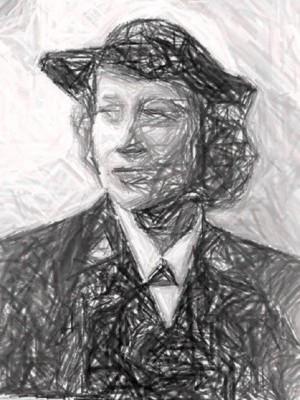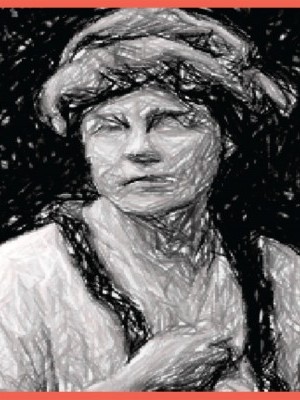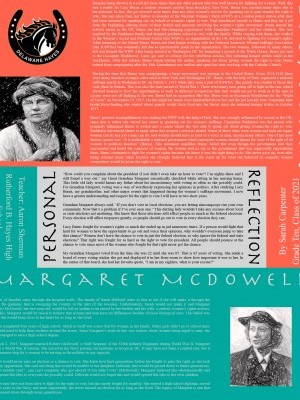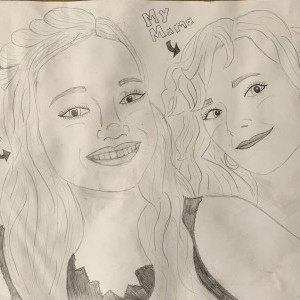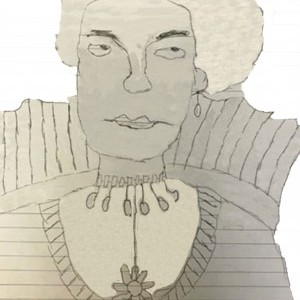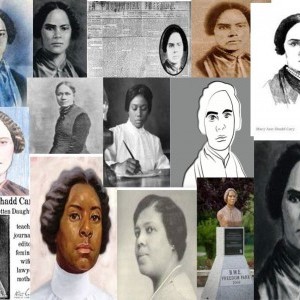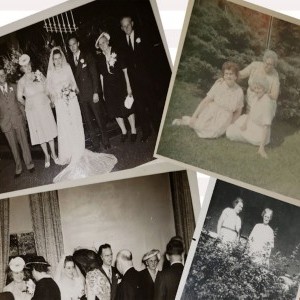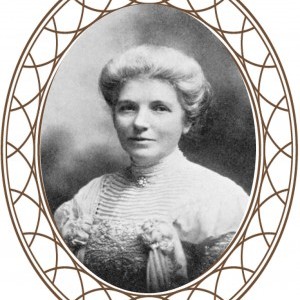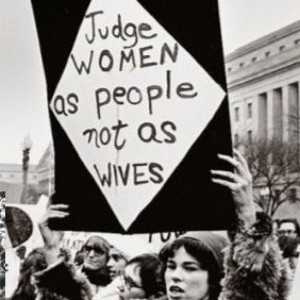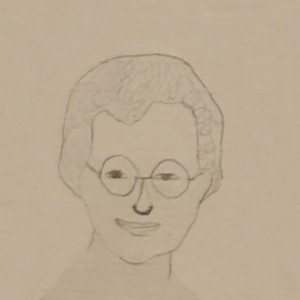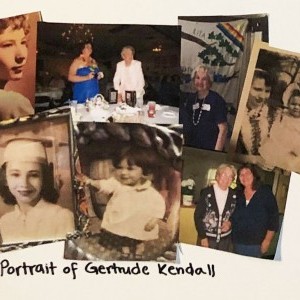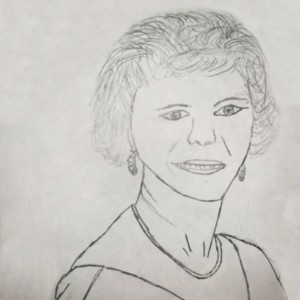Sarah Carpenter
Rutherford B. Hayes High School | Delaware City, OH | 10th Grade
Inspirational Family Member
The Passion of my Great-Grandma Margaret
The cries of families carry through the hospital walls. The family of Sarah Hubbard waits in fear to see if she will make it through the horrible flu epidemic that is sweeping the country at the start of the twenties. Unfortunately, Sarah would not make it and Margaret (Lallance) McDowell, her two-year-old, would be left an orphan to be raised by her brother and his wife, a zealous women’s rights activist. Due to this, Margaret would be raised to believe that women and men have no differences besides obvious biological ones. This belief was one that she would keep close to her heart for as long as she lived.
Margaret completed four years of high school, which in itself was a new feat for women in her family. Many girls didn’t go to school since they would need to help their mothers around the house. Since Margaret’s sister-in-law was zealous about women being equal to men, she was encouraged to earn a high school degree. On March 2, 1947, Margaret married Robert McDowell, a Staff Sergeant of the 328th Infantry Regiment during World War II. Margaret was also a World War II veteran. She served in the Navy passing out uniforms to troops in DC. It may have not been a combat role, but it was a immense step for a woman to be serving in the military in any capacity.
Margaret would never miss an election or a chance to vote. She knew how hard generations before her fought to gain this right, so she took it at every opportunity. She said one thing that would be notable to her daughter, Deborah, that would be passed down to future generations. Margaret notably said,“...one can’t complain who got elected if you didn’t vote” (McDowell). Margaret believed this wholeheartedly and would spread this idea to everyone she possibly could. Deborah would not forget this and would spread this idea to her own children.
Margaret may have not been alive to fight for the right to vote, but she surely fought for equality. She earned a high school diploma, served for a few years in the Navy, and most importantly, she never missed an election for as long as she lived. The legacy of Margaret is one that will be passed down through many generations.
Historical Figure I Admire
Lucy Burns
Imagine being thrown in a cold jail more times than any other person who was well known for fighting for a cause. Well, this was a reality for Lucy Burns, a zealous women's activist from Brooklyn, New York. Burns was arrested many times due to her activism. In fact, she got arrested more times than any other woman activist for speaking out to gain women the right to vote. She met Alice Paul, her fellow co-founder of the National Woman’s Party (NWP), at a London police station after they had been arrested for speaking out on behalf of women's rights to vote. Paul introduced herself to Burns and they hit it off from the beginning, sharing many of their beliefs and passions involving the women’s rights movement. Burns started her activist career in the UK where she had life-changing experiences with Emmeline Pankhurst and her children. She was inspired by the Pankhurst family and dropped graduate school to stay with the family. While staying with them, she worked in the Women’s Social and Political Union (aka WSPU), an organization in the UK devoted to fighting for women’s rights.
After returning to the United States, Burns and Paul began working with the National American Woman Suffrage Association (aka NAWSA) but eventually left due to questionable goals in the organization. The two women, followed by many others, left and formed the NWP. After being arrested in Washington DC for launching a protest at the White House, Burns got sent to the Occoquan Workhouse. Later, she got put in solitary confinement for her rebellious actions, like initiating hunger strikes while in the workhouse. After her release, Burns began touring the nation, speaking out about giving women the right to vote. Burns retired from campaigning after the 19th Amendment was ratified and spent her time working with the Catholic Church.
During the time that Burns was campaigning, a large movement was starting in the United States. From 1914-1918 there were many marches in major cities such as New York and Washington DC. Burns, with the help of Paul, organized a national suffrage march in Washington DC on March 3, 1913, while they were a part of NAWSA. The parade was similar to those that took place in Britain. This was also the time period of World War I. There were many men going off to fight in the war, which allowed women to have the opportunities to work in different occupations that they would not get to work in if the men in society were not off fighting in the war. Burns had an occupation like this. Burns was in Occoquan Workhouse for the “Night of Terror” on November 15, 1917. On this night her hands were handcuffed above her and she got harshly beaten. Sometime later brutal force-feeding also started where guards would force food into her throat since she initiated hunger strikes in October 1917.
Burns’ greatest accomplishment was starting the NWP with the help of Paul. She was strongly influenced by society in the UK, since that is where she started her career in speaking out for women's suffrage. Emmeline Pankhurst was the person who primarily influenced Burns to switch into a career where she was able to speak out about giving women the right to vote. Pankhurst introduced Burns to many ideas that women activists shared. Some of these ideas were women and men are equal, women can do any job a man can do, and women should have as loud of a voice as men, among many others. One of her most famous quotes was: “It is unthinkable a national government which represents women should ignore the issue of the right of all women to political freedom” (Burns). This statement amplifies Burns’ belief that even though the government said they represented and heard the concerns of women, the women had no say in the government that was supposedly representing them. Burns continued to fight for women’s rights because she knew it was the right thing to do. She never gave up, even after being arrested many times because she strongly believed that if she stood up for what she believed in, someday women everywhere would be given the right to vote.
What the Project Means to Me
“How could you complain about the president if you didn’t even take an hour to vote! I’m eighty-three and I still found a way out,” my Great-Grandma Margaret sarcastically chuckled while sitting in her nursing home. This little old lady would harass my father about his inconsistency with voting as often as she possibly could. For Grandma Margaret, voting was a way of wordlessly expressing her opinions in politics. After studying Lucy Burns, my grandmother, and other major events that happened during the women’s suffrage movement, I now have a greater understanding and respect for the right to vote I will have in two short years.
Grandma Margaret always said, “If you don’t vote in local elections, you are letting nincompoops run your own community. Now that’s a problem if I’ve ever seen one.” This darling lady wouldn’t take any excuses about local or state elections not mattering. She knew that those elections still affect people as much as the federal elections. Every election will affect taxpayers greatly, so people should go out to vote in every election they can.
Lucy Burns fought for women’s rights so much that she ended up in jail numerous times. If a person would fight that hard for women to have the opportunity to go out and voice their opinions, why wouldn’t everyone jump to take that chance? Women don’t have the chance to vote in just the federal election, so why ignore the federal and state elections? That right was fought for as hard as the right to vote for president. All people should pounce at the chance to vote since most of the women who fought for that right never got the chance to cast a ballot.
My Grandma Margaret voted from the time she was 22 until she was 87. That is 65 years of voting. She made a board of every voting sticker she got and displayed it in her front room to show how important it was to her. In the center of that board, she had her favorite quote, “I am in my eighties, what is your excuse?”
Explore the Archive
More From This Class
Click on the thumbnails below to view each student's work.Deadline Extended
There's still time to join Women Leading the Way.
Become a part of our storytelling archive. Enroll your class today.
Join the Project

